Simak, Cliffard D - Project Pope - Notisblokk
VIP免费
2024-12-12
1
0
379.46KB
140 页
5.9玖币
侵权投诉
Simak, Cliffard D - Project Pope
Title: Project pope
Author: Clifford D. Simak
Original copyright year: 1981
Genre: science fiction
Book price (of scanned edition): GBP 1.75
Comments: to my knowledge, this is the only available e-text of this book
Source: scanned and OCR-read from a paperback edition with Xerox TextBridge Pro
9.0, proofread in MS Word 2000.
Date of e-text: July 4, 1999
Prepared by: Anada Sucka
Anticopyright 1999. All rights reversed.
Project pope
Clifford D. Simak
Prologue
Thomas Decker was half an hour from home when Whisperer stopped him in his
tracks.
- Decker, said Whisperer, speaking inside Decker's mind. Decker, now I'll get
you. This time I will get you.
Decker swiveled about on the game trail he had been following, his rifle raised,
held away from his body, ready to snap to his shoulder against the first sign of
danger.
There was nothing in sight, nothing stirring. The heavy growth of trees and
brush came down close against the trail on either side. It all hung motionless.
There was not the slightest breeze, no flicker of a bird. There was absolutely
nothing. Everything was frozen, as if eternity had clamped down.
- Decker!
The word was inside his mind. There had been no sound, nothing spoken. The only
sound was in his mind and he had never been able to decide, in all his previous
encounters with Whisperer, if there had been a sound inside his mind. He just
knew the words, lodged there in that area of his brain in the front of his head,
just above his eyes.
- Not this time, Whisperer, he said to the other, speaking to it as it had
bespoken him, no words uttered, but forming the thoughts and words inside his
mind for Whisperer to read. Today I'm not playing any games with you. I've
played the last game with you. There won't be any more.
- Chicken, said Whisperer. Chicken, chicken, chicken!
- To hell with your chicken business, said Decker. Come out and show yourself
and see if I am chicken. I've had it with you, Whisperer. I'm up to here with
you.
- You are chicken, said Whisperer. You had me in your rifle sights last time and
you did not pull the trigger. Chicken, Decker, chicken.
- I have no reason to kill you, Whisperer. Actually no wish to. But, so help me
God, I'll let you have it just to get rid of you.
- If I don't get you first.
- You've had chances at me, said Decker. You must have had a lot of chances. So
let's quit this bickering. Let us stop this horseplay. You don't want to kill me
any more than I want to kill you. You just want to keep on playing. I'm sick of
your silly games. I'm hungry and I'm tired and I want to get on home. I don't
want to play hide-and-seek with you, chasing you up and down the woods.
By now he had figured out where Whisperer was located, and he shifted slightly
in the path to face the spot where Whisperer was hidden in the underbrush.
- You had good luck this time, said Whisperer. You found a lot of gems. Maybe
even diamonds.
- You know damn well I didn't. You were with me. You watched me all the time. I
sensed you.
- You work hard, said Whisperer. You should find diamonds now and then.
- I'm not looking for diamonds.
- What do you do with what you find?
- Whisperer, why all these silly questions? You know what I do with them.
- You give them to the captain of the ship to sell at Gutshot. He steals you
blind. He sells them for three times what he tells you that he gets.
- I suspect he does, said Decker. But what the hell? He needs the money more
Side 1
Simak, Cliffard D - Project Pope
than I do. He's putting together a stake to buy that place on Apple Blossom. Why
this sudden interest, Whisperer?
- You do not sell him all?
- That is true. I keep the better pieces.
- I could use some of your better pieces.
- You, Whisperer? What would you want of them?
- Shape them. Carve them. Change them.
- You are a carver, Whisperer?
- Not an accomplished carver, Decker. Just a hobbyist. Now he knew exactly where
Whisperer was located. If he made the slightest move, he would let him have it.
Whisperer wasn't fooling him with this talk of gems and carving. It was just a
lot of talk to throw him off his balance.
He might as well, Decker told himself, put an end to it. For months now, this
hidden clown had been pestering him, trailing him and watching him, jeering at
him, threatening him, getting him to play the silly game, making an utter fool
of him.
- I could show you, in a stream not far from here, said Whisperer, a place where
there are many gems. There is one piece, a large chunk of jade, I want very much
myself. Get the jade for me and you can have all the rest.
- Get it yourself, said Decker. If you know where it is, get it for yourself.
- But I cannot, said Whisperer. I have no arms to reach, no hands to grasp, no
strength to lift. You must do it for me. After all, why not? We are friends. We
have played games enough to even be old friends. We've been at it long enough.
- Once I get my hands on you, said Decker. Once I get you in the sights again.
- What you had in your sights, said Whisperer, was not me. It was a shadow, a
shape I made that you would think was me. When you saw the shape and did not
shoot, I knew you were my friend.
- Friend or not, said Decker, shape or not, shadow even, next time I'll pull the
trigger.
- We could be friends, said Whisperer. We've spent an infancy together. We have
romped and played together. We've grown to know one another. Now that we have
matured...
- Matured?
- Yes, Decker, our friendship has matured. No more play is needed. It was only a
rite. Perhaps it was foolish of me to inflict the rite upon you. A rite of
friendship only.
- A rite? You're crazy, Whisperer.
- A rite you did not recognize, did not understand, and yet you played it with
me. Not always willingly, not always in good temper, often cursing and frothing
and thirsting for my blood, but you played it with me. And now that the rite is
done, we can go home together.
- Over my dead body will we go home together. I'll not have you cluttering up
the cabin.
- I would not clutter greatly. I would take little room. I could squeeze into a
corner. You would not even notice me. And I need a friend so greatly. I must
pick a friend so carefully. I must find one that is tuned to me -
- Whisperer, said Decker, you are wasting your time. Whatever the hell you are
driving at, you're wasting your time.
We could be good for one another. I would carve your gems and talk with you on
lonely nights and sit before the fire with you, and there would be many tales we
could tell each other. You, perhaps, could help me with Vatican -
- With Vatican! yelled Decker. What in the name of Christ have you to do with
Vatican?
One
Jason Tennyson, fleeing for his life, came in low over the precipitous mountain
range that lay to the west of Gutshot. Immediately after he caught sight of the
lights marking the town, he pressed the ejection button and felt himself flung
upward with a greater violence than he had expected. For a moment he was
enveloped in darkness; then, as his body spun, he saw the lights of the town
again and thought that he also saw the flier. But whether he saw the flier or
not, he knew, was of slight importance. It would continue over Gutshot, angling
slightly downward over the ocean that hemmed in the tiny town and spaceport
against the towering mountains. Some fifty miles out to sea, if his calculations
were correct, the flier would go into the water and be lost. And lost as well,
he hoped, would be Dr. Jason Tennyson, lately court physician to the margrave of
Daventry. The radar at Gutshot space base undoubtedly had picked up the flier
Side 2
Simak, Cliffard D - Project Pope
and would track it on its course across the water, but at its low altitude, the
base would soon lose contact with it.
His fall was slackening and suddenly, as the chute popped open to its full
extent, he was jerked sidewise and began swinging in wide arcs. An updraft
caught the chute, forcing it back toward the looming peaks and slowing the
swinging; but in a moment it slid out of the updraft and was floating smoothly
downward. Tennyson, dangling at the end of the lines, tried to make out where he
would land; it seemed toward the south end of the spaceport. He held his breath
and hoped. He threaded his arms through the chute straps and clutched his
medical bag, holding it close against his chest. Let it go well, he prayed - let
it continue to go well. So far it had gone surprisingly well. All the way he had
held the flier low, rocketing through the night, making wide circuits to avoid
feudal holdings, where radars would be groping skyward, for in this vicious
world of contending fiefs, a close watch was always kept. No one knew at what
time or from what direction raiders might come swooping in.
Peering down, he tried to gauge how close he might be drifting to solid ground,
but the darkness made it impossible to judge. He found himself tensing, then
consciously willed himself to relax. When he hit, he had to be relaxed.
The grouping of lights that marked the town was some distance to the north; the
spatter of brilliance that was the spaceport was almost dead ahead. A blackness
intervened to shield out the spaceport lights and he hit the ground, knees
buckling under him. He threw himself to one side, still holding tightly to the
bag. The chute collapsed and he struggled to his feet, pulling on lines and
shrouds.
He had landed, he saw, close to a group of large warehouses at the south end of
the port. It had been the bulk of the warehouses that had cut off the spaceport
lights. Luck, he realized, had been with him. Had he been able to plan it, he
could not have chosen a better landing site.
His eyes now were becoming accustomed to the night darkness. He was situated, he
saw, near an alley that ran between two of the warehouses. He saw also that the
warehouses were set on pilings; a foot or so lay between the ground and the
foundations of the buildings. And there, he thought, was where he could hide the
chute. He could bundle it together and push it as far into the space as he could
reach. If he could find a stick of some sort, he could even push it farther. But
all that was needed was to push it far enough that it would not be spotted by a
passerby. This would save him considerable time. He had feared that he might
have to try to dig a hole or find a clump of trees in which to hide the chute.
All that was necessary would be for it not to be found for several days; hidden
underneath the warehouse, it might not be found for years.
Now, he thought, if he could find a ship and, somehow, get aboard. He might have
to bribe some member of the ship's personnel, but that should not be hard. Few
of the ships, most of which were freighters, that touched down at Gutshot would
visit the port again for a long time, perhaps for years; others of them might
never come this way again. Once on the ship, he would be safe. Unless someone
found the chute, there would not be any evidence that he had ejected from the
flier.
The chute safely hidden, the bag now unstrapped from about his waist and carried
in his hand, he made his way down the alley between the two warehouses. At the
mouth of the alley, he stopped. Out on the port, directly opposite where he
stood, was a ship. The gangplank was down and a long line of people - all of
them aliens of various sorts - were being herded up the plank and into the ship
by a small group of ratlike creatures. The line extended some distance back from
the ship, and the ratlike guards were yelling at the aliens in the line, waving
clubs at them to hurry them along.
The ship would be taking off soon, Tennyson told himself, puzzled at what kind
it was. Few passenger liners came down at this port, and this one did not have
the appearance of a liner. It was a dumpy old tub, blackened and disreputable.
Its name was painted above the port and it was some time before Tennyson could
make out that it spelled WAYFARER, for the paint was flaking and there was much
rust upon the hull. There was no smartness to the ship. It was not the sort of
craft that any self-respecting traveler would choose. But, while he looked at it
with some distaste, Tennyson reminded himself that he was not in a position to
be discriminating. The ship apparently would be leaving soon, and that was far
more important than knowing what kind it was. If he could manage to get aboard,
that would be good enough. If his luck still held for him...
Tennyson edged out beyond the alley's mouth. To his right, beyond the warehouse,
a splash of light flared out across a walk that paralleled the perimeter of the
field. Walking out cautiously a few feet farther, he saw that the light came
Side 3
Simak, Cliffard D - Project Pope
from a small bar.
Some sort of altercation had arisen at the bottom of the gangplank. A spiderlike
alien, all arms and legs, was arguing with one of the ratlike creatures that
were superintending the boarding. As Tennyson watched, the spidery alien was
pushed out of the line, with one of the rat beings following, prodding it with a
club.
The front of the warehouse lay in deep shadow and Tennyson edged along it
rapidly. He came to the end and stood still, looking at the bar. His best
course, he figured, would be to get beyond the bar and approach the ship from
its forward end. Huddling in its shadow, he might be able to approach the
gangplank and wait for a chance.
The last of the line of passengers were snaking up close to the gangplank. In a
few more minutes, the boarding would be completed. The ship might not take off
immediately, but he had the hunch that if he was going to get aboard, he would
have to act quickly.
To get past the bar, he decided that he would simply walk past, moving
confidently, as if he had the right to be there. Someone might see him but
probably would pay no more than passing notice of him. The spidery alien had
disappeared and the guard had returned to a position near the gangplank.
Leaving the corner of the warehouse, Tennyson set off down the walk that passed
in front of the bar. Beyond the bar, deep shadows again lay in front of another
warehouse. If he could reach that warehouse without being challenged, he
probably could make it to the ship. On a secondary port such as this one,
security measures were not tight.
Now he was passing in front of the bar. Looking in one of the three windows from
which the light poured, he glimpsed a coat rack standing beside the door. He
paused in midstride, riveted to attention by what he saw. Hanging on the rack
was a blue jacket, with the word WAYFARER stitched in gold thread across one
breast. Above it rested a cap that matched the jacket.
Acting on impulse, Tennyson swung toward the door, went through it. A mixed
group of humans and aliens were sitting in tables at the back; a few were lined
up at the bar. The barkeep was busy. A couple of people lifted their heads and
looked at him when he came in, then went back to what they had been doing.
Swiftly he reached out to grab the jacket and the cap, then was out the door
again, his shoulders hunched, expecting an outcry behind him. But there was
none.
He slapped the cap onto his head, shrugged into the jacket.
The line in front of the ship's gangplank was gone; apparently everyone had
boarded. Only one ratlike creature remained standing at the gangplank's foot.
Swiftly, purposefully, Tennyson strode across the field, heading for the ship.
The one ratlike guard might challenge him, but he doubted it. The jacket and cap
should be sufficient disguise. More than likely the guard would not recognize
him as an intruder. Few humans could recognize any particular alien; to them all
aliens looked alike. The same was true of aliens, who ordinarily could not
distinguish one human from another.
He reached the foot of the gangplank. The ratlike creature made a sloppy salute.
'Welcome, sir,' it said. 'Captain has been asking after you.'
Two
After a time, one of the ratlike crewmen found him in the small, closetlike
equipment hold where he had squeezed himself to hide. The crewmen hauled him out
and took him to the captain, who was alone in the control room, sitting at his
ease in one of the three chairs. At the moment nothing needed to be done; the
ship was running on its own.
'What is this you have?' the captain asked.
'Stowaway,' the rat creature said. 'Dug him out of a small aft hold.'
'Okay,' the captain said. 'Leave him here. You can go.'
The rodent turned to go.
'My bag, please,' said Tennyson.
The rat turned around, still holding the bag.
The captain said, 'Give the bag to me and then get out of here. Get the hell out
of my sight.'
The rat turned over the bag and left hurriedly.
The captain examined the bag thoughtfully, then lifted his head and said, 'So it
is Jason Tennyson, is it? M.D.?'
Tennyson nodded. 'Yes, I am a doctor.'
The captain set the bag down on the deck beside him. 'I've had a few stowaways
Side 4
Simak, Cliffard D - Project Pope
in my time,' he said, 'but never a doctor. Doctor, tell me, just what is going
on?'
'It's a long story,' said Tennyson, 'and I'd prefer not going into it.'
'You'd been in that hold for hours,' the captain said. 'I suppose you sneaked on
at Gutshot. Why did you wait so long?'
'I was about to come out,' said Tennyson. 'Your rat-faced friend beat me to it.'
'He is no friend of mine.'
'My error,' said Tennyson.
'There aren't many humans out here,' the captain said. 'The farther out you go,
the fewer you will find. I have to use this kind of scum to man the ship. And I
have to haul loads of other scum out to End of Nothing and-'
'Out to the end of what?'
'End of Nothing. That is where we're going. Don't tell me you weren't headed
there?'
'Until this moment,' Tennyson said, 'I had never heard of it.'
'Then it must be that you were intent on leaving Gutshot.'
'That, Captain, is a fair assumption.'
'In some sort of trouble there?'
'I was running for my life.'
'And popped onto the first ship that was taking off?'
Tennyson nodded.
'Sit down, man,' the captain said. 'Don't stay standing there. Would you like a
drink?'
'That would be fine,' said Tennyson. 'Yes, I could use a drink.'
'Can you tell me?' the captain asked. 'Did anyone see you duck into the ship?'
'I don't think so.'
'You're fairly sure?'
'Well, you see, I went into a bar. One of the spaceport joints. When I left, it
seems that somehow I got hold of the wrong jacket and wrong cap. I was, if I
remember, in somewhat of a hurry...'
'So that's what happened to Jenkins's cap and jacket. Jenkins is my first mate.'
'I'll return the jacket and the cap,' said Tennyson. 'I left them in the hold.'
'I find it strange,' the captain said, 'that you did not take the pains to find
out this ship's destination. You, apparently, have no wish to go to End of
Nothing.'
'Any place away from Gutshot,' said Tennyson. 'They were closing in on me. Well,
maybe not, but I had the feeling that they were.'
The captain reached for a bottle that was standing on a table beside him and
handed it to Tennyson.
'Now I'll tell you, mister,' he said, 'I am convention-bound to quote the rule
book to you. It says in Article Thirty-nine, Section Eight, that any stowaway
must be placed in detention and returned thereafter, as speedily as possible, to
the port where he had stowed away, there to be delivered up to the port
authorities. During the intervening period, while he is on board the vessel on
which he stowed away, he is required to do such tasks, however menial, the
captain may assign to him to help defray his passage. Are you aware of these
provisions, sir?'
'Vaguely,' said Tennyson. 'I know it is illegal to stow away. But I must tell
you-'
'There is, however, another matter which I feel compelled to consider,' the
captain told him. 'I have the feeling, knee-deep as I am in alien scum, that
humans under whatever circumstances, should always stick together. We run fairly
thin out here and it is my opinion that we should be supportive of one another,
overlooking transgressions if they be not too odious. . .
'Your attitude does credit to you,' said Tennyson. 'There has been something
I've been trying to tell you and haven't had the chance. You see, sir, I am not
a stowaway.'
The captain turned steely eyes on him. 'Then tell me what you are. If you're not
a stowaway, what are you?'
'Well, let us say,' said Tennyson, 'that I was simply pressed for time. That I
did not have the time to arrange for passage by going through the formal
channels. That, for compelling reasons I have revealed to you, I couldn't afford
to miss your ship, so came aboard in a rather unorthodox manner, passed on board
by an unsuspecting alien crew member who mistook me for the mate and -'
'But you hid away.'
'Easy to explain. I feared that you might not give me the time to explain my
situation and be so conscientious as to heave me off the ship. So I hid and
waited until there seemed little chance you could do anything but continue on
Side 5
Simak, Cliffard D - Project Pope
your way.'
'By all of this, do I understand you to be saying that you stand prepared to pay
your passage?'
'Most certainly I do. If you'll only name the figure.'
'Why,' said the captain, 'most willingly indeed. And I'll charge you not one
tittle above the regular fare.'
'That's considerate of you, sir.'
'Dr. Tennyson,' the captain said, 'please go ahead and drink. You have not
touched the bottle to your lips. It makes me nervous to see you sit there and
merely fondle it.'
'I'm sorry, Captain. I didn't mean to make you nervous.' Tennyson tipped the
bottle, took a generous swallow, then lowered it again.
'Marvelous,' he said. 'What is it?'
'It's a concoction called Scotch,' the captain told him. 'It first was brewed on
Mother Earth.'
'You mean Old Earth?'
'That's right,' the captain said. 'The home planet of us humans.'
'I have a great curiosity about Old Earth. Have you ever been there?'
The captain shook his head. 'Few humans have ever set foot upon its sacred soil.
We are scattered far and thin in space, and few of us go on that pilgrimage we
always promise ourselves that someday we will make.'
'Ah, well,' said Tennyson. He tilted the bottle once again.
'To get back to our arrangement,' the captain said. 'I fear I have to tell you
that I have no place for you. The cabins, the few that I have, are filled. Even
my own quarters are rented out to a horde of scaly horrors who are pilgriming to
End of Nothing. At the end of the voyage, I shall have to fumigate the place
before I can move back in, and it may be years before I am rid of the stench of
them.'
'Why let them have it, then?'
'Because of money,' said the captain. 'This particular band of scum is filthy
rich and they must have my best accommodations without regard to cost. So that
is how it is. I charged each of the bastards a triple fare. Although I think now
I may live to regret my greed. The mate and I are sharing his quarters, turn and
turn about. The mate is a devoted garlic eater. Thinks it keeps him healthy.
Only dire necessity forces me to crawl into his bunk.'
'The mate is the only other human?'
'Ordinarily, yes. Just the two of us. The crew is made up of rat people, like
the one who found you, and other assorted unsavory beings. The passenger hold
and cabins are filled with nauseating pilgrims.'
'If you dislike aliens so much, why are you in this business? Surely you could
operate in freight.'
'Five more years of this,' the captain said. 'Five more years is all that it
will take. There's no real money in freighting. But hauling these damned
pilgrims is profitable if you can stand it. And I can stand it, just barely, for
another five years. For, by then, I will have money enough to retire. Back to a
pink planet, name of Apple Blossom. Silly name, of course, but it's perfect for
the planet. Have you ever been on a pink planet, Doctor? There are not many of
them.'
'No, I never have.'
'Pity,' said the captain.
A tap sounded from the direction of the open door.
The captain swung about in his chair. 'Oh, there you are, my dear,' he said,
obviously pleased.
Tennyson also swung about. A woman stood in the doorway. She was statuesque,
with broad shoulders and hips. Her eyes crinkled in an expressive face. Her
mouth was generous and soft, her hair a halo of gleaming gold.
'Come in, please,' said the captain. 'As you see, we have picked up another
passenger. Four humans aboard on a single trip. I believe that to be a record.'
'If I am not intruding,' she said.
'You are not,' the captain told her. 'We are pleased to have you. Jill Roberts,
this is Dr. Tennyson. Dr. Jason Tennyson.'
She held out her hand to Tennyson. 'I am glad to see another human. Where have
you kept yourself?'
Tennyson froze momentarily. Turning her head, the woman had exposed her other
cheek. Across it, from temple to jaw, covering almost the entire right cheek,
was an angry, ugly slash of red.
'I am sorry, Doctor,' she said. 'It is the way I am. It has horrified my friends
for years.'
Side 6
Simak, Cliffard D - Project Pope
'Please forgive me,' said Tennyson. 'My reaction is inexcusable. As a physician.
. .'
'As a physician, there is nothing you can do about it. It is inoperable. No
cosmetic surgery is possible. Nothing. I have to live with it; I have learned to
live with it.'
'Miss Roberts,' said the captain smoothly, 'is a writer. Articles for magazines.
A long shelf of books.'
'If that bottle has not grown fast to your hand,' said Jill Roberts to Tennyson,
'how about letting loose of it?'
'Certainly,' Tennyson said. 'Let me wipe it off.' He scrubbed its neck on his
shirt sleeve.
'It appears there are no glasses aboard this bucket,' said Jill Roberts. 'But I
don't really mind. Drinking out of a bottle after someone else is only another
way to trade around some germs.'
She took the bottle and sat down in the one remaining chair. 'Where are you
putting up?' she asked Tennyson. 'I recollect the captain told me all the cabins
are filled. He hasn't put you down in steerage with the alien cattle, has he?'
'Dr. Tennyson,' said the captain primly, 'was a late show. I have nowhere to put
him. He turned up unexpectedly.'
She raised the bottle to her lips, lowered it, looked inquiringly at Tennyson.
'Is that true?' she asked.
Tennyson grinned. 'The captain is trying to be polite. Actually, I was a
stowaway. As to accommodations, neither of you should worry about it. I can curl
up anywhere. I'm just glad to be aboard.'
'That is not quite right either,' said the captain. 'He did stow away, but now
he offers to pay his passage. Technically, he no longer is a stowaway.'
'You must be starved,' Jill said, 'unless you brought along a lunch.'
'I never thought about it,' said Tennyson. 'I was in too much of a hurry. But I
could do with a steak.'
'You'll get no steaks on this tub,' said Jill, 'but there's guck to fill the
gut. How about it, Captain?'
'Surely,' the captain agreed. 'Almost immediately. I'm sure something's left.'
Jill rose and tucked the bottle underneath her arm. 'Send the food to my cabin,'
she told the captain, then turned to Tennyson.
'Come along, you. We'll get you washed up and your hair combed and see what you
really look like.'
Three
'Now for some ground rules,' said Jill. 'On such short acquaintance, I'm not
about to crawl into bed with you, but I will share the bed -or, I suppose, the
bunk, for it's really not a bed. Like the captain and the mate, we'll take turns
in it. You can use the can - on board such a ship as this, I think it's termed a
head. We'll eat our meals together and we can sit and talk and play my music
crystals. I'll ignore a pass or two, being naturally good-natured and more
kindly than is good for me, but if you get too heavy, I'll heave you out.'
'I shall not get too heavy,' said Tennyson, 'however much I may be tempted. I
feel something like a stray dog someone picked up.'
He used half a slice of bread to mop up his plate, sopping up the gravy left
over from the stew.
'In my ravenous hunger,' he told her, 'this meal was tasty, but it had a strange
tang to it. Stew, of course, but a stew of what?'
'Don't ask,' she said. 'Just shut your eyes and eat. Holding your nose helps,
too, if you can do that without strangling. There is a deep, dark suspicion that
when one of the pilgrims die - and some of them do, of course, packed into
steerage as they are. . .'
He waved a helpless hand at her. 'Please, Jill, desist. My body needs the food
and I'd like to keep it down.'
'I would not have thought a doctor would have a queasy stomach.'
'Doctors, my dear,' he said, 'are not total brutes.'
'Put the plate away,' she told him. 'You've mopped it shining clean. I still
have the captain's bottle-'
'I noticed. You just marched off with it.'
'It's not the captain's bottle. He simply pilfers it and the consignee looks the
other way. He hauls in several cases on every trip, I understand. Special-order
shipments for the gnomes at Project Pope.'
'Gnomes at Project Pope? What in hell have gnomes to do with it, and what is
Project Pope?'
Side 7
Simak, Cliffard D - Project Pope
'You mean you don't know?'
'Not at all,' he said.
'Well, I guess they're not really gnomes, although it's a term that is often
used for them. Some of them are humans, but the most of them are robots.'
'That's no real answer,' said Tennyson. 'Tell me what you're talking about. It
sounds mysterious and-'
'What about you, my friend?' she asked. 'What's all your mystery? The captain
said you stowed away and then you paid your passage. And if you don't know about
Project Pope, why are you heading out for End of Nothing? There's no reason to
go there except for Project Pope.'
'So help me,' said Tennyson, 'before I set foot on this ship, I had never heard
of End of Nothing or of Project Pope. What is this End of Nothing?'
'In due time,' she said, 'I shall be glad to give you all the details that I
have. But you give first. I took you in, remember. I am sharing with you. Now,
let's each have a drink, then you start.'
They each had a drink. He wrested the bottle from her and took another one, then
handed it back.
'You know,' he said, 'that stuff has authority.'
'Give,' she said.
'Well, first of all, I really am a doctor.'
'I never doubted that. I had a peek into your bag.'
'You know about Gutshot, the planet that we took off from.'
She shivered. 'A horrid little place, although I was glad enough to get there.
It was the last stop on the way to End of Nothing and, working my way out,
there've been too many stops. I never dreamed, of course, that I'd have to put
up with such a filthy ship to get there. I asked around. Would you believe it,
this is the only ship between Gutshot and End of Nothing. This captain of ours
has the pilgrim trade tied up.'
'About the pilgrims...'
'Nothing doing. First you talk of Gutshot, then I'll talk of gnomes and popes
and pilgrims.'
'It's simply told,' said Tennyson. 'Gutshot, as you may know, is a feudal
planet. A lot of nasty little fiefs headed by crews of dirty people - some of
them human, but a lot of them not. I was court physician to the margrave of
Daventry. Human, as you may have guessed. A human doctor trained in human
medicine would be of little use to aliens. It was not the job I would have
picked, but at the time I considered myself lucky to get it. A young physician
fresh out of medical school ordinarily finds it hard to get started in his
profession unless he has some money. I had no money, of course, and there didn't
seem to be too many clinics that were looking around for fresh new talent;
besides, it costs a fortune to set up a practice of your own, after which you'd
sit around for several years, slowly starving, until people began coming to you.
Once the initial shock of Gutshot wore off, I became somewhat accustomed to it.
Like you can grow accustomed, after a time, to an aching tooth. So I stayed on.
The fees were good. In fact, to me, they seemed princely. The margrave was not a
bad guy. Not good, but not bad either. We got along together. Then the bastard
up and died on me. Nothing wrong with him. Just tipped over. Heart attack, I'd
guess, although there hadn't been any indication he was heading for one. I
didn't really have a chance to determine cause of death and-'
'But no one could blame you. It was not your -'
'What you can't comprehend,' he said, 'is the kind of politics there are in any
feudal setup. A pack of wolves held in restraint by one man. Loose the leash and
they're at one another's throats. I'd not consciously been involved in any
politics, but I had sort of been the margrave's lieutenant and advisor,
unofficially of course, so considerable resentment was aimed at me. Almost
immediately the rumor sprang up that the margrave had been poisoned, and before
it got well started, I was on my way. I had no real power base and knew it. I
would have been a pigeon for almost anyone. I gathered up most of my ill-got
earnings, which I had been careful to keep in a handy place and in highly
transportable form, stole a flier, and was out of there as fast as I could
manage. Night was coming on and I flew low and crooked to keep out of any radar
range. I knew there was no place on the planet where I'd be safe-'
'So you headed for the spaceport.'
'Right. I knew I didn't have much time. I figured there were people about three
jumps behind me. So I had to find a ship and find it fast. One that would be out
in space before the posse hit the port.'
'So that's it?'
'That's it,' he said. 'What worries me most is the captain. I had to tell him
Side 8
Simak, Cliffard D - Project Pope
some of it. I should have lied, of course, but had little time to think up a lie
and. . .'
She shook her head. 'You don't need to worry about our precious captain. If he's
questioned, he'll swear he knows nothing of you. He's not looking for trouble.
He's got this End of Nothing monopoly all tied up and doesn't want to lose it.
It's a gold mine for him. He hauls a load of pilgrims out, dumps them off, packs
in the ones he hauled on the previous trip and takes them back to Gutshot.'
'They all come form Gutshot? I never heard of any pilgrims there.'
'Probably none from Gutshot, which is just the port of entry to End Of Nothing.
They come from all over this sector of the galaxy, flying in from everywhere,
gathering and waiting for the ship to End of Nothing. Then our captain herds
them aboard and flies them out to Project Pope.'
'You're not a pilgrim?'
'Do I look like one?'
'No, you don't. How about the loan of that bottle for a moment?'
She handed him the bottle.
'I don't know the entire story,' she said. 'I'm going out to have a look at it.
It should provide material for several articles. Perhaps even a book.'
'But you must have some idea, which is more than I have.'
'Just the basic rumor. Just the tangled stories that one hears. Actually rumor
may be all, but I think not. There must be something out there, with all this
pilgrim traffic. I tried first to track down where the pilgrims were coming
from, but that proved a dead end. There is no concentration of them. A few come
from one planet, a few from still another, one or two from yet a third. All of
them non-human - maybe specific kinds of aliens, although of that I'm not sure.
Apparently all members of obscure cults or sects. Maybe each sect has a
different faith - if you can call what they have a faith - but all of them are
somehow tied in with this Pope project. That doesn't necessarily mean they know
anything about it. It may just be something on which they can base a shaky
faith. Creatures of all kinds reaching for a faith, willing to grab at almost
anything just so it's mysterious or spectacular, preferably both. The thing that
bothers me, the thing that sends me out, is that the whole business has a human
ring to it. The site of Project Pope, as I understand it, is called Vatican-17
and-'
'Hold up a minute,' said Tennyson. 'That does have a human ring. There was a
Vatican on Earth...'
'There still is,' she said. 'The center of the Roman Catholic faith, which still
exists on Earth and on several other human planets, is still headed by a pope
and is still as strong as ever, perhaps stronger, its people still as devout as
ever. But I doubt that this Vatican-17 has anything to do with the one on Old
Earth. It sounds like some sort of take-off. For one thing, there are robots-'
'What would robots have to do with an Old Earth religion?'
'I don't know and I don't think it is an Earth religion. Someone, perhaps the
robots, borrowed the terminology...'
'But robots?'
'I know. I know. That's what I'm trying to find out.'
'And End of Nothing?'
'End of Nothing,' she said, 'is out on the Rim. Among the Rim stars, of which
there are not many. A lot of space. Not much of anything else. At the very edge
of intergalactic space. So far as the planet is concerned, I know nothing except
that it is Earthlike. No trouble for humans to live there. This ship, I am told,
gets there in a standard month or less. How many times the speed of light that
is, I have no idea. The old crate is equipped with an inertial drive, which one
would not suspect in such a wreck. No great danger involved. It mostly crosses
empty space. The ship makes six round trips a year, which spells out to an awful
lot of pilgrims hauled.
The captain is an enigma. He probably could have command of one of the proudest
interstellar liners; he has the required status. But here he is, running
pilgrims he despises.'
'But making a barrel of money. Told me five more years and he can retire to a
planet named Apple Blossom.'
'Yes, he told me that, too. Apparently he tells everyone. I don't know how much
to believe.'
'Perhaps all of it,' said Tennyson. 'Men do strange things to cash in on their
dreams.'
'Jason,' said Jill, 'I like you. Do you know why I like you?'
'My honesty and trustworthiness,' he said. 'My humanity, my compassion, my
integrity...'
Side 9
Simak, Cliffard D - Project Pope
'No, none of those. I like you because you can look at me without flinching. You
don't pull away. People, to start with, always pull away and flinch. I have come
to terms with it myself; I wish other people would.'
'I scarcely notice,' he said.
'You're a cheerful liar. You do notice it. No one could help but notice it.'
'The shock, what initial shock there is,' he said, 'comes from the fact that
otherwise you are so beautiful. Without the cheek, your features are classic.
One side of your face arrestingly appealing, the other side marred.'
'You can even talk about it,' she said, 'and make it sound all right. No pity
for me. Not even sympathy. As if it were quite normal. And that helps a lot. To
be accepted as I am. I tried so hard. I went to so many different clinics. I was
examined by so many people. And always the same verdict. Capillary hemangioma.
Nothing to be done. One specialist-can you imagine it?-suggested I wear a mask,
a half-mask covering the bad side my face. He assured me that one could be
molded and fitted -'
'If it's a mask you are looking for,' he said, 'you have the best one that there
is - your self-acceptance.'
'You really think so, Doctor?'
'Of course I do.'
'The bottle, please,' she said. 'Let us drink to that.'
They drank to it, solemnly, in turn.
'One question,' he said. 'Not to change the subject, but a practical question.
Once we get to End of Nothing, what kind of accommodations will we find? What
kind of place to stay?'
'I have reservations,' she said, 'at a place called Human House. I don't know a
thing about it except that it's expensive - if that's any criterion.'
'When we arrive, may I take you to dinner that first evening? To take the taste
of this ship out of our mouths.'
'Why, thank you, sir,' she said. 'That is thoughtful of you.'
Four
They sat in the control room, sprawled out in the chairs.
'Don't make the mistake,' the captain warned them, 'of thinking of the robots of
Project Pope as happy little servitors. They are high-powered electronic
contraptions. Some people think they have managed to construct organic brains
for themselves, but this I somehow doubt. Such a thought stems from the
prejudicial viewpoint of a biological being. There is no reason to believe, once
you think of it realistically, that a technological thinking and reasoning
apparatus, given the present state of the art, need be one whit inferior to a
human brain, or, actually, any kind of brain. These robots, for centuries, have
been continually upgrading their capabilities, improving themselves in many
different ways, as a human mechanic will keep on dinging up an engine to make it
run better.'
'How well are you acquainted with them?' Tennyson asked.
'Normal contacts only,' the captain replied. 'The necessary contacts for the
conduct of my business. I have no friends among them, if that is what you're
asking.'
'I'm sorry if I seemed to question you,' said Tennyson. 'I was simply curious.
It seems I'm being plopped down into a situation I know nothing about. I'd like
to find out as much as I can.'
'I have been told,' said Jill, 'that the robots have humans working for them.'
'I don't know if the humans are working for them,' the captain told her. 'Maybe
they are working together. There are humans, a rather large corps of them. But
my contacts never have been with the humans. I see only the robots and then only
when they want to see me. Project Pope is a big operation. No one outside
Vatican really seems to know what is going on. One story has it that the robots
are trying to build an infallible pope - an electronic pope, a computer pope.
There appears to be an idea that the project is an outgrowth of Christianity, an
Old Earth religion.'
'We know what Christianity is,' Jill said. 'There still are a lot of Christians,
perhaps more than ever before. True, Christianity no longer looms as important
as it did before we began going into space. This, however, is a relative thing.
The religion is still as important as ever, but its seeming importance has been
diluted by the many other faiths that exist in the galaxy. Isn't it strange that
faith is so universal? Even the ugliest aliens appear to have a faith to cling
to.'
'Not all of them,' said the captain. 'Not all of them by any means. I have run
Side 10
摘要:
展开>>
收起<<
Simak, Cliffard D - Project PopeTitle: Project popeAuthor: Clifford D. SimakOriginal copyright year: 1981Genre: science fictionBook price (of scanned edition): GBP 1.75Comments: to my knowledge, this is the only available e-text of this bookSource: scanned and OCR-read from a paperback edition with ...
声明:本站为文档C2C交易模式,即用户上传的文档直接被用户下载,本站只是中间服务平台,本站所有文档下载所得的收益归上传人(含作者)所有。玖贝云文库仅提供信息存储空间,仅对用户上传内容的表现方式做保护处理,对上载内容本身不做任何修改或编辑。若文档所含内容侵犯了您的版权或隐私,请立即通知玖贝云文库,我们立即给予删除!
相关推荐
-
.net笔试题选择题集VIP免费
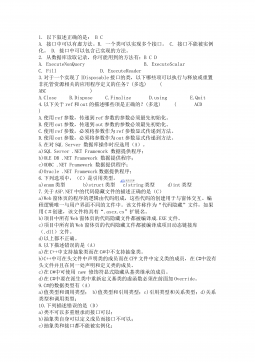
 2024-11-14 29
2024-11-14 29 -
产品需求文档 - 适合敏捷迭代开发的PRD文档应该怎么写VIP免费
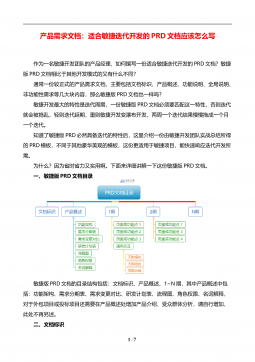
 2024-11-23 5
2024-11-23 5 -
产品需求文档 - 面向产品需求的验证管理VIP免费
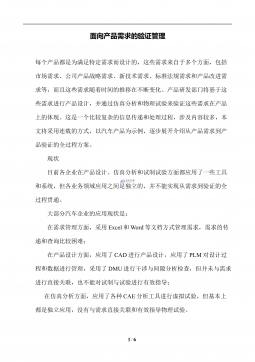
 2024-11-23 4
2024-11-23 4 -
产品需求文档 - 没有标准,只有沟通VIP免费
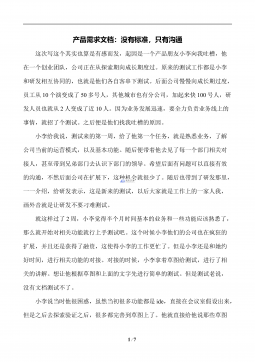
 2024-11-23 4
2024-11-23 4 -
产品需求文档 - 产品需求应该怎么写VIP免费
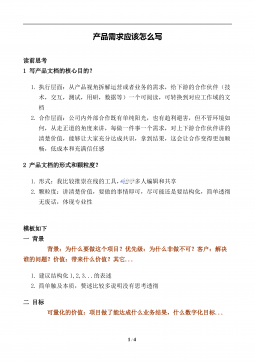
 2024-11-23 5
2024-11-23 5 -
产品需求文档 - 产品需求文档 PRD模板VIP免费

 2024-11-23 33
2024-11-23 33 -
产品需求文档 - 产品需求核心组件分析VIP免费
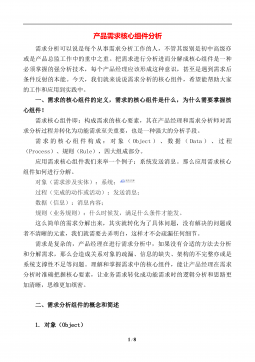
 2024-11-23 45
2024-11-23 45 -
2024版.新高考版.高考总复习.数学.5·3A版1_1集合VIP免费

 2024-11-23 29
2024-11-23 29 -
2024版.新高考版.高考总复习.数学.5·3A版1_1集合(分层集训)VIP免费

 2024-11-23 16
2024-11-23 16 -
产品需求文档 - 产品技能树之需求分析(一)VIP免费

 2024-11-23 9
2024-11-23 9
分类:外语学习
价格:5.9玖币
属性:140 页
大小:379.46KB
格式:PDF
时间:2024-12-12




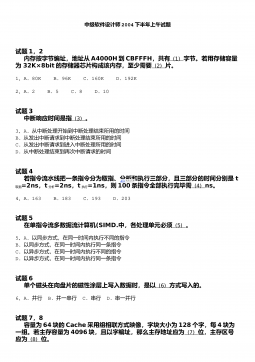
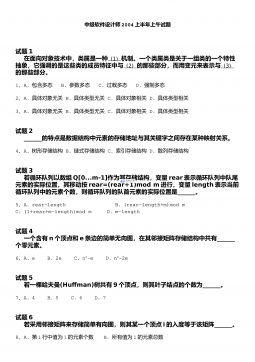
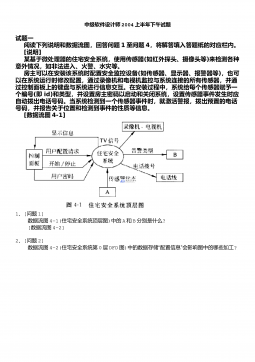
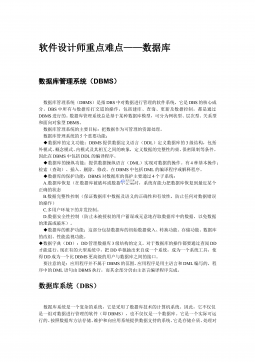
 渝公网安备50010702506394
渝公网安备50010702506394
